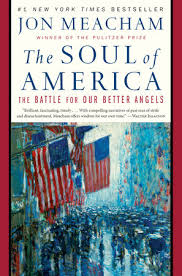We seem to live in unusually contentious times. Tensions between established ethnic groups and against new immigrant groups seems on the rise. Many wonder if peace and justice still have a place in our future.
In The Soul of America, Jon Meacham says the lens of history can offer a corrective perspective. Our current situation is not unprecedented. By touching on key conflicts and changes over the centuries, Meacham shows that our better angels have always had to struggle to overcome our lesser instincts.
The  Civil War to end slavery was one such struggle. But the battle continued on new fronts, the rise of the Ku Klux Klan in the late nineteenth and early twentieth centuries being one of the most obvious. The decades-long, hard fought struggle to gain women the vote in 1920 was another high point except that it took so much effort to achieve what now seems so obvious.
Civil War to end slavery was one such struggle. But the battle continued on new fronts, the rise of the Ku Klux Klan in the late nineteenth and early twentieth centuries being one of the most obvious. The decades-long, hard fought struggle to gain women the vote in 1920 was another high point except that it took so much effort to achieve what now seems so obvious.
The powerful fear-mongering of media-savvy Senator “Play Fast and Loose with the Facts” Joe McCarthy in the 1950s was certainly a low point. Yet politicians of both parties were finally willing to challenge him. Soon thereafter the determined efforts of Dr. Martin Luther King Jr and President Lyndon Johnson to overcome fear led to the passing of the landmark Civil Rights Act and Voting Rights Act of 1964 and 1965.
Throughout our history the doors of immigration have also alternately opened wider and narrowed through many cycles. The shameful internment of Japanese Americans during World War II was followed in the 1960s by widening the doors of immigration from Asia.
The three-steps-forward-two-steps-back nature of American history is not new nor is it easy. Meacham suggests nonetheless that this should be cause for hope about our present situation. After all, it will not last.
We are far from a perfect nation. But we are a country rooted in the propositions that “all men are created equal,” that all have a right to equal justice under the law, and that the freedoms of religion, speech, the press, and the right to assemble and petition the government for redress of grievances shall not be abridged.
As we strive to live up to our aspirations for the future, says Meacham, we do well to remember our past.
